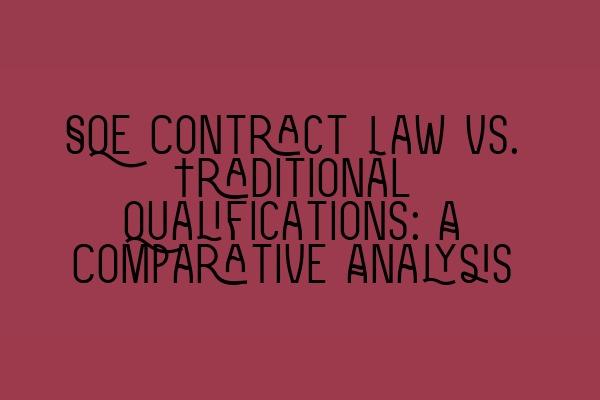SQE Contract Law vs. Traditional Qualifications: A Comparative Analysis
As the legal industry continues to evolve, so too does the path towards becoming a qualified solicitor. With the introduction of the Solicitors Qualifying Exam (SQE), prospective solicitors now have an alternative to the traditional route of obtaining a law degree followed by the Legal Practice Course (LPC). In this article, we will provide a comparative analysis of SQE Contract Law and traditional qualifications, exploring their benefits, drawbacks, and impact on the legal profession.
What is SQE Contract Law?
The SQE Contract Law is a specific element of the SQE that focuses on assessing a candidate’s understanding and application of contract law principles. This includes areas such as the formation of contracts, terms and breaches, remedies, and legal interpretation. By passing the SQE Contract Law assessment, individuals can demonstrate their competence in this key area of legal practice.
Benefits of SQE Contract Law
One of the primary benefits of the SQE Contract Law is its flexibility. Unlike traditional qualifications, which often require several years of study before being eligible to practice law, the SQE allows individuals to begin their legal career sooner. By passing the SQE Contract Law assessment, candidates can quickly gain the necessary qualifications to practice contract law and start working as a solicitor.
Furthermore, the SQE Contract Law offers a more focused approach to legal education. While traditional qualifications cover a broad range of legal subjects, the SQE Contract Law delves deeply into contract law principles and provides a comprehensive understanding of this specific area. This specialization can be advantageous for individuals who have a specific interest in contract law or who plan to specialize in this field.
Drawbacks of SQE Contract Law
However, it is important to note that the SQE Contract Law is not without its drawbacks. One of the main concerns is the lack of practical training. While traditional qualifications, such as the LPC, often include a practical component where students gain hands-on experience, the SQE Contract Law focuses primarily on theoretical knowledge and assessments. This may result in individuals entering the legal profession without practical skills and experience, which could impact their ability to effectively practice contract law.
Additionally, the SQE Contract Law may face challenges in terms of recognition. As it is a relatively new qualification, its acceptance and recognition within the legal industry may take time. Some law firms and employers may still prioritize candidates with traditional qualifications, which could limit the opportunities available to those who have completed the SQE Contract Law.
Impact on the Legal Profession
The introduction of the SQE Contract Law has the potential to revolutionize the legal profession. By providing an alternative route to becoming a qualified solicitor, it opens doors for individuals who may not have had the opportunity to pursue a traditional law degree or LPC. This increased accessibility can lead to a more diverse and inclusive legal profession, which is beneficial for both clients and practitioners.
Furthermore, the SQE Contract Law’s focus on specific areas of law, such as contract law, ensures that candidates have a deep understanding of these subjects. This specialization can result in solicitors who are highly knowledgeable and skilled in their designated areas, providing better legal services to clients.
Conclusion
In conclusion, the SQE Contract Law offers a unique and alternative path to becoming a qualified solicitor. While it provides flexibility and specialization in contract law, there are also concerns regarding practical training and recognition. It is important for individuals considering this route to carefully weigh the benefits and drawbacks and evaluate their career goals and aspirations.
To gain further insights into contract law and its various aspects, you may find the following related articles useful:
– Exploring the Impact of Frustration on Contractual Obligations: Legal Insights
– Interpreting Contractual Clauses: Unlocking the Hidden Meanings
– Legal Aspects of Business Contracts: Key Considerations for Entrepreneurs
– Agreements in Contract Law: Understanding Its Various Types
– Essentials of Consideration: Understanding the Basis of Contractual Exchange
These articles delve into different aspects of contract law, providing valuable insights and knowledge for both aspiring solicitors and legal professionals.
